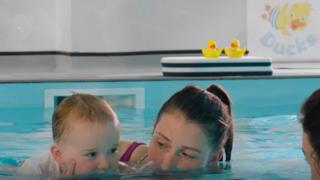 Image copyright
Puddle Ducks
Image caption
Daniel and Hannah Lancaster in the pool
Image copyright
Puddle Ducks
Image caption
Daniel and Hannah Lancaster in the pool
"They change when they get into the water, their eyes just light up," says mum of two Hannah Lancaster.
Her children Daniel, three, and Daisy, two, have been swimming since they were just a few weeks old and are excited to get back in the pool after three months.
The government announced on Thursday that outdoor pools could open this weekend while indoors pools can do so from 25 July.
But it will be a different experience for the Lancaster family when they return after the coronavirus lockdown.
No longer will they be able to sit at the side and watch the other classes while they chat to friends, instead it will be straight back home.
"It will be different," Hannah, 31 tells the BBC, "but a lot of things now are and we are going to have to get used to the new normal."
"Daisy is a little bit young to understand but Daniel can't wait to get back in the pool," she adds.
The activities will be different too with only the instructor allowed to sing and parents being encouraged to be more hands-on with their own children's needs to prevent the virus spreading between families.
"In terms of the actual lessons people are going to have to be more socially distanced," says Jo Stone, managing director of Puddle Ducks, which runs classes across the country, including those attended by the Lancasters.
"The teacher can't be as hands-on, we will be expecting customers to bring their own equipment and it will only be the teacher singing.
"Some activities will be adapted while others we won't be able to do."
What do I need to know about the coronavirus?
While the government announcement means pools can reopen before the end of the month, many will not be ready to do so as safety plans need to be put in place and lifeguard training needs to be brought up to date.
Guidance has been laid out by the government and Swim England. It includes:
Swimmers coming to the pool "beach ready" in their costumes Booking of time slots to prevent overcrowding Swimmers to bring their own equipment No overtaking Ensuring chlorine levels are high enough to kill the virusFor those who use the pools for their classes or training it means having to adapt to a new set of rules, with each facility required to put a safety regime in place.
Marlborough Penguins head coach Rich Smith is hoping to get back to the poolside as soon as possible to put members of the Wiltshire club through their paces.
"We are hoping to get going as soon as possible but we are not hedging our bets to be back on 25 July," he explains. "The government can announce it but the pools have to get their staff back in, get them trained back up and then get working from there.
"We are all excited, it has been 17 weeks."
Image copyright Rich Smith Image caption Rich Smith said his club were excited to get back in the poolIt will be a relief to get back in the water after three months of land training online, as a result of which Mr Smith says he and his coaching team had lost weight due to joining in the workouts.
He adds that Swim England's sports psychologist will be speaking with swimmers to help them mentally focus on the return to the pool and in dealing with the struggles of the pandemic.
Can chlorine kill coronavirus?
Yes.
Chlorine is used as a disinfectant in pools and can easily disable viruses, including coronavirus, as well as more resilient bugs such as bacteria.
The chemical has to be used at the right concentration, but this will be standard practice.
There are two infection risks in the pool - other swimmers themselves and water they may have contaminated.
Sage, the government's science advisors, say the risk of catching the virus through water is "negligible".
But being within 2m of other swimmers - perhaps when catching your breath in the shallow end - is a bigger risk.
Remember the risks are about more than just the pool. Coronavirus is spread through close contact, so beware in a cramped changing room.
And it can linger on surfaces such as lockers, benches, shower buttons and taps.
Swim England chief executive Jane Nickerson warns that while many pools are looking forward to reopening, there are lots that face an uncertain future.
She is calling for the government to invest in pools after warning that more than 10% of pools may never reopen.
One pool that will not be reopening in the coming weeks is Petersfield Open-Air Swimming Pool, in Hampshire, after renovation works were delayed due to the virus.
Now the trustees are faced with the choice of opening for a short season or waiting until 2021.
Image copyright Petersfield Open Air Pool Image caption Petersfield Open Air Pool is undergoing renovations which have been delayed due to the pandemicA normal season for an open-air pool would last until mid-September but if the lido is not able to open soon it will be unviable to open until next year.
"If we can only get four weeks, in which we can only support 30 people an hour, then it will be very hard to break even," says Linda Knutsen, chair of the trustees. "We have to think about what is best for the future of the pool."
While Petersfield will not be reopening, Ms Knutsen says other open-air pools are planning to over the coming days.
For the Lancasters, who live in Northwich, Cheshire, any trip to the pool will be worthwhile after weeks of lockdown.
"Being in the bath just isn't the same as the pool," Mrs Lancaster says.

 5 years ago
563
5 years ago
563 

